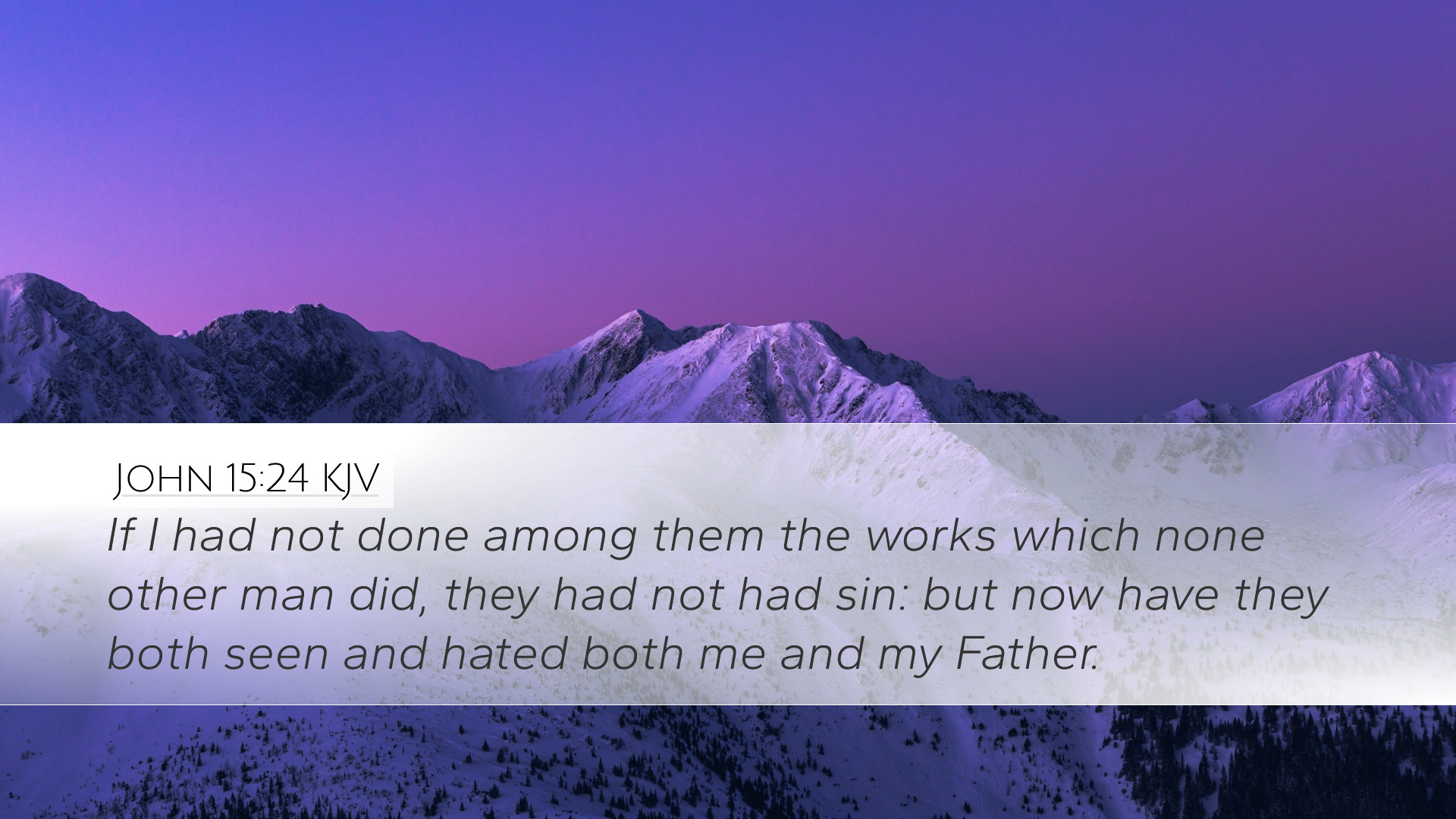Old Testament
Genesis Exodus Leviticus Numbers Deuteronomy Joshua Judges Ruth 1 Samuel 2 Samuel 1 Kings 2 Kings 1 Chronicles 2 Chronicles Ezra Nehemiah Esther Job Psalms Proverbs Ecclesiastes Song of Solomon Isaiah Jeremiah Lamentations Ezekiel Daniel Hosea Joel Amos Obadiah Jonah Micah Nahum Habakkuk Zephaniah Haggai Zechariah MalachiJohn 15:24
John 15:24 KJV
If I had not done among them the works which none other man did, they had not had sin: but now have they both seen and hated both me and my Father.
John 15:24 Bible Commentary
Commentary on John 15:24
Bible Verse: "If I had not done among them the works which none other man did, they had not had sin: but now have they both seen and hated both me and my Father."
Understanding the Context
In the Gospel of John, Jesus presents profound truths concerning His identity and mission. This particular verse falls within the broader discourse of John 15, where Jesus speaks of His relationship with His followers and the world. The context is significant, as Jesus prepares His disciples for the tribulations they will face due to their association with Him.
Insights from Matthew Henry
Matthew Henry highlights the gravity of Jesus’ works, indicating that His miracles were not just acts of compassion but were also profound messages revealing His divine nature. Henry notes that these works served as evidence of Jesus’ authority, condemning the unbelief of those who witnessed them.
- Works of Christ: Henry underscores that the uniqueness of Christ's works sets Him apart. The miraculous performances that no one else had accomplished amplify the rejection faced by Jesus.
- Hate as a Response: Henry elaborates that the hatred directed at Jesus and the Father is a direct consequence of the revelation made through His works. The manifestation of divine truth often provokes opposition.
Insights from Albert Barnes
Albert Barnes emphasizes the theme of accountability in this verse. He asserts that the presence of Jesus and His miraculous works has made the sin of the people more profound.
- Knowledge Increases Accountability: Barnes argues that when one is exposed to divine truth and miraculous evidence, the refusal to believe constitutes a greater sin.
- Unity with the Father: Barnes notes that the hatred of Jesus is inherently linked to the hatred of the Father, as Jesus perfectly embodies divine revelation and character.
Furthermore, Barnes indicates that the verse reveals the intensity of spiritual blindness that can exist even in the face of clear evidence.
Insights from Adam Clarke
Adam Clarke provides a more detailed examination of the implications of the miracles performed by Jesus. He remarks that the rejection of Jesus signifies a rejection of the divine.
- The Works as Evidence: Clarke asserts that the miracles performed were not merely for the surface healing or provision but served as signs of the greater spiritual reality of the Kingdom of God.
- Hate Defined: Clarke defines the term 'hate' as it pertains to spiritual opposition, indicating that such animosity reflects a deeper spiritual struggle against the light and truth.
Clarke also discusses the implications for believers today—highlighting that the faithful often face misunderstanding and trepidation as they embody the love and truth of Christ in a world that can be resistant to it.
Theological Implications
John 15:24 not only encapsulates the essence of Christ’s ministry but serves as a critique of spiritual blindness and rejection of God’s revelation. The works of Christ stand as a challenge to all who encounter them. This invites a profound reflection on how knowledge of God’s truth invites responsibility, accountability, and the unfortunate reality of opposition.
- Rejection of Truth: As articulated by Henry, Barnes, and Clarke, the works of Christ unveil the human condition—often marked by a spirit of rebellion and refusal to acknowledge divine authority.
- Role of the Spirit: This verse also underlines the mission of the Holy Spirit in a believer’s life, to convict the world of sin, righteousness, and judgment as seen in John 16:8.
- Call to Perseverance: For pastors and spiritual leaders, this verse serves as an encouragement to persevere in teaching and upholding truth, even when faced with adversity.
Application for Believers
Pastors, students, and theologians can draw from John 15:24 several key applications as they navigate theological education and pastoral ministry:
- Encouragement in Ministry: Understanding that rejection can follow faithfulness in ministry, believers can find solace in the examples of Christ’s perseverance in love.
- Mission of Outreach: The works of Christ must be exemplified in the lives of believers—calling for active engagement in demonstrating love and truth to a world in need.
- Awareness of Spiritual Warfare: Recognizing that spiritual hostility exists, believers are encouraged to equip themselves with prayer and the Word of God as their defense.
Conclusion
John 15:24 serves as a profound reminder of the stakes involved in engaging with the divine. The response to Jesus and His works reveals much about the human heart's posture before God. As church leaders and scholars study this verse, may they be inspired to define their ministry through the lens of Christ’s unwavering commitment to reveal the truth, even amidst rejection. This commitment not only informs orthodoxy but is foundational for a faithful witness in a challenging world.


